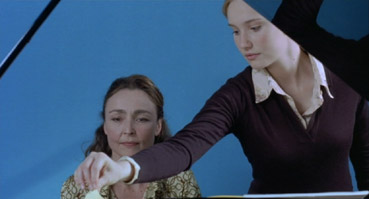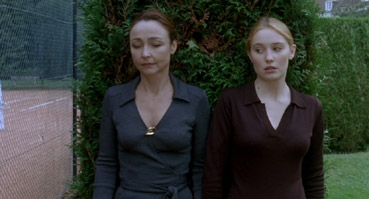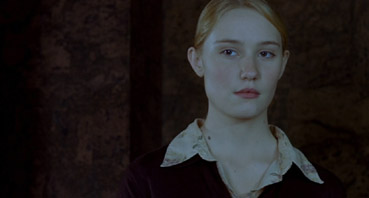|
As
someone who likes to think he is not influenced by any form
of advertising, I nonetheless cannot help but look back with surprise at the first poster I saw for musician turned filmmaker
Denis Dercourt's The Page Turner [La
Tourneuse de pages]. Now I'm not talking about
the real poster here, but the ones Artificial Eye place
in Sight & Sound to announce its latest releases.
Regular readers of the magazine will know the ones I mean
– they usually consist of a promotional still accompanied
by the title, usually in the same font as their other ads,
plus a couple of choice quotes and details of the film's
release. In this case, the still was true to the title and
consisted of a brightly lit image of a young blonde woman
in the process of turning a page of music for an older female
pianist, both of them recognisable faces and positioned
against a blank blue wall. Flicking through the magazine
for the first time, that image, together with that title,
did one thing really well – it failed to make a significant
impression. I saw, I briefly registered, and I moved on
without reading any of the white lettered quotes that sat
within. Something in my brain had processed the information
and come up with a film as banal as the page layout, something
to return to and investigate later. Perhaps. Not influenced
by advertising, huh? Hmm.
Of
course I did return to it – the film society I co-run is screening a 35mm
print of it in April – but I couldn't help thinking that a small
portion of this film's potential audience might just pass
it by for the very same reasons that misdirected me. The ad suggests a polite, respectable character study, a
typically European one that focusses on a background
character rather than the obvious lead. The Hollywood film, I mused,
would be about the piano player, about the pressures of fame,
the highs and the lows, while this French director chooses
to concentrate on the life of the girl who just sits there
and turns the pages for the maestro. Oh yes, forming a false
opinion about anything can be done in blink of an eye. Nothing
about the look of that ad (I'm conveniently ignoring the
quotes here), suggests a slow burning psychological thriller,
and a damned unsettling one at that.

The prologue introduces us to 10-year-old Mélanie,
a gifted pianist on the eve of taking an important exam.
Her parents, both butchers by trade, insist that even if
she doesn't pass it then they will continue to pay for her lessons,
but she's having none of it. As far as she's concerned she either passes or gives
up on music forever. The day of the competition arrives
and her turn comes to perform before the panel. It all goes
well until one of the judges, well-known concert pianist
Ariane Fouchécourt (Catherine Frot), thoughtlessly
responds to a request for an autograph, distracting Mélanie
and causing her to falter, a mistake that costs her the
exam and her potential future.
OK,
this requires a minor leap of faith on the part of the audience,
or at least this part of it. I, for one, had a little trouble swallowing
the idea that anyone could or even would just wander into
a music exam in the middle of a performance, especially
one being taken by an inevitably nervous child, and ask one of
the judges for an autograph. But I'm prepared to swallow
it for now to get to the meat of the film.
Ten
years later (there's no caption, it doesn't need one),
Mélanie (Déborah François of the Dardene
brothers' L'Enfant)
lands an internship with a respectable law firm. Her colleague
lets slip that their boss, top lawyer Jean Fouchécourt
(Pascal Greggory), is looking for someone to watch over
his son for a couple of weeks in November. As her internship
finishes before then, Mélanie volunteers and Jean
gratefully accepts, advising her that due to the countryside
location of his home, she'll have to move in with his family. On arriving at the house, she is introduced to Jean's son Laurent and his
wife Ariane, who lo and behold is the same Ariane Fouchécourt
who was responsible for Mélanie failing that exam ten years
earlier, an incident the pianist appears to have no recellection
of. Jean reveals that Ariane has been left emotionally scarred
by a hit-and-run accident two years earlier and is shortly
to embark on her first public performance since then.
He explains that his wife will need all the
support she can get, and despite her coolly detached demeanour,
Mélanie starts to get emotionally closer to her new employer. On demonstrating
her skill as a page turner (an assistant to a pianist who
turns the pages of the sheet music while they play), she is asked by
Ariane to serve in that function at her upcoming concert.

From
the moment Mélanie enters the Fouchécourt
household, you just know that revenge must be on her mind, but what's
hard to fathom is when or how or even if she will take
it. Red herrings are intermittently thrown into the mix, none of which
I have any intention of revealing, and the most obvious
opportunity occurs too early in the narrative to actually
be taken, although the fact that Mélanie sidesteps this raises further questions
about her true intentions.
This uncertainty fuels a constant air of low key but very palpable
menace, with every look Mélanie gives Ariane seemingly coloured
with potentially malevolent purpose, enhanced by Jérôme
Lemonnier brooding, unsettling score and the slow tracks
and drifting Stedicam shots of Jérôme Peyrebrune's
atmospheric cinematography. And that picture on the Sight
& Sound ad was on the nose after all – the menace
here doesn't hide in the shadows but sits openly in the
daylight in brightly lit rooms, with the black walled subterranean
swimming pool and its strangely long approach corridor providing
the film's only real whif of gothic.
What
really sells it are the two lead performances, especially
the excellent Déborah François, whose icy
cool and subtle suggestiveness make Mélanie probably
the most creepily compelling film character I've spent time with all
year. It's a masterful portrayal that hints at so much while
revealing so little – you can see the cogs turning, but
her thought processes are always teasingly indecipherable.
The ante is later upped by a sharp reaction to
an unwelcome come-on, and an extraordinary moment when she
unexpectedly meets up with an old friend whilst shopping and allows her
façade to slip, only to switch it back on in a skin-crawling
instant.
There
are traces here of Joseph Losey's The Servant
and the thrillers of Claude Chabrol, but this is
Dercourt's movie and never feels borrowed or in the shadow
of another. Early on, I was certain I knew how things would
play out but was repeatedly misdirected, and by the midway
mark had given up trying to second-guess a narrative whose
surface simplicity hides a subtle complexity that really
does keep you guessing. If your preference is for intelligent
thrillers that slowly burrow under your skin rather than
rollercoaster their way through the plot, that whisper in
your ear rather than yell in your face, then The
Page Turner should definitely be on your viewing
list.
The
anamorphic 1.85:1 transfer here is a solid one that at first
glance appears to lack sparkle due to the toned-down colour
palette and subtle exterior gloom, but this is intentional.
Detail and contrast levels are generally good, and there
is no obvious digital noise, despite the sort of single-colour
walls that can invite blocking.

Dolby
2.0 stereo and 5.1 surround soundtracks are included and
neither are show-off pieces, though both have excellent
clarity and dynamic range, reproducing the all-important
score and musical performances very nicely. The 5.1 is the
superior track, having a little more punch and using the
surrounds nicely for location atmospherics.
Both
the English Trailer (1:34) and
the French Trailer (1:32) are
effectively suggestive without giving too much away.
Filmographies are provided for director Denis Dercourt and actresses Catherine
Frot and Déborah François.
Making
of Featurette (38:14)
A substantial and informative behind-the-scenes featurette
that includes interviews with Denis Dercourt and the two
lead players, plus some engaging footage of the shoot,
which provides us with a glimpse of the impossibly energetic
and upbeat Dercourt's exuberant directing style.
Interview
with Director Denis Dercourt and Actress Déborah
François (56:25)
A lengthy and worthwhile interview that alternates between
an English speaking Dercourt and a French speaking and subtitled
François. Inevitably, there is some crossover with
the interview in the above featurette, but there's still
a great deal of interest here, with plenty of detail provided
on the development of the characters (especially Mélanie),
the casting, the story, the music, the design and the editing.
Dercourt freely admits to having an obsession with control
and precision with all elements in the film, and has some
interesting things to say about the development of digital
filmmaking.
A
tense, subtle and intelligent tale of revenge and control
that is well presented on Artificial Eye's DVD, whose extra
features collectively run for longer than the film itself.
Recommended.
|